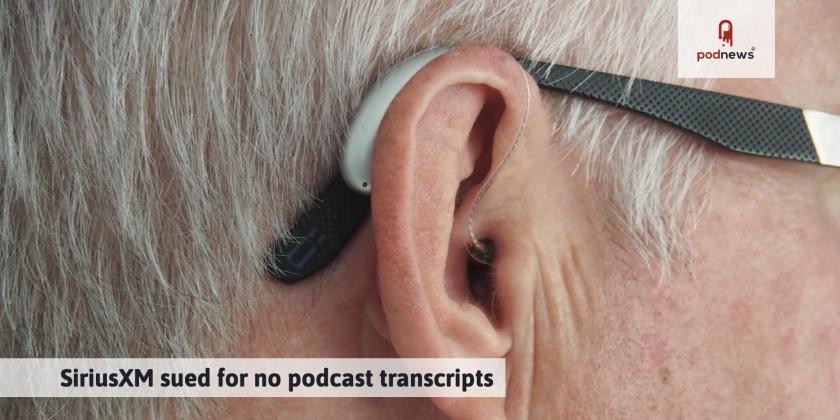
SiriusXM sued for no podcast transcripts
This article is at least a year old
-
In a test case with repercussions for the entire industry, SiriusXM is being sued for failing to provide podcast transcripts for deaf users by the National Association for the Deaf and the Disability Rights Advocates. We’ve a focused look at transcripts below.
-
Podfollow, a configurable service which generates free links for your podcast to help you promote it, has had its 20 millionth clickthrough. It had achieved 1m in Dec 2019.
-
Podbuddy is a new app for iOS that makes interactive video clips from podcast audio. Based on your phone, rather than your desktop, it allows for easier sharing to places like TikTok, Snapchat, or Facebook.
-
An Apple fan writes to Tim Cook about all that is wrong with Apple Music. Tim Cook responds. (Anyone want to do this for Apple Podcasts?)
Sep 9 2023: This broken link now points to the Internet Archive.
Moves and hires - with Pod People
- Marianne Boström has been promoted to Chief People Officer at Acast. Jonas Björk is the company’s new Chief Technology Officer. Georgina Holt is has been promoted to Managing Director for the Americas; she was looking after UK+ for the podcast company.
This link is no longer available, as at Sep 9 2023
Transcripts: the state of the industry
-
As we researched in June 2020, transcripts can offer significant SEO benefits, and welcomed by audiences. Transcripts can also allow podcasts to have better contextual advertising. Podcast producers, however, are split about whether automated transcripts are respectful of their work or accurate enough.
-
The
podcast:transcripttag is an open standard, supported by a number of podcasts and offers both static transcripts (in HTML or text) or real-time captions (in the SRT format). It has significant usage already - widely supported by many modern podcast hosts including Captivate, Transistor, Buzzsprout, Omny Studio and others, a number of podcast apps display these transcripts, including the popular Android app Podcast Addict. This open standard enables podcast publishers to produce accurate transcripts for themselves. -
Automated, proprietary, transcripts are in use by some podcast apps. Their output may be inaccurate or wrong, which could lead to significant legal issues for podcasters.
- Amazon Music has a proprietary solution for transcripts, which are patchy and automated. There is no mechanism for publishers to supply their own transcripts.
- Spotify added the right to transcribe using their own proprietary solution in May 2020, and a limited beta “over the coming weeks” in May 2021, in an eerily familiar refrain. There is no mechanism, once more, for publishers to supply their own transcripts.
-
For hardware manufacturers, you’ll be surprised:
- Google offers live captions within every Android app on Pixel phones; that live caption tool is also available on desktop Chrome if you listen within a browser. However, this is all on-device; the company doesn’t support the
podcast:transcripttag, and there’s no current evidence that they transcribe audio, though they have done in the past. Sister company YouTube offers automated and manual captions. - Apple offers a number of accessibility options, but surprisingly doesn’t offer any live captioning. It does use automated transcripts in its podcast search engine; but the excerpts from those appear to suggest that transcripts aren’t done on all shows and aren’t good enough for display. The company doesn’t support the
podcast:transcripttag.
- Google offers live captions within every Android app on Pixel phones; that live caption tool is also available on desktop Chrome if you listen within a browser. However, this is all on-device; the company doesn’t support the
-
With the exception of Podcast Addict (see above), no major podcast app supports transcripts - Pocket Casts, Overcasts, or others. That seems an opportunity. Podscribe offers a transcript player which can be embedded on websites; Captivate’s podcast player also includes transcripts.
-
In terms of podcasts to test things on, Podland contains live captions and transcripts using the
transcripttag. Also using that tag, the Podnews podcast contains a transcript only.
Opinion: Just as podcast publishers are responsible for libel or copyright infringement, so podcast publishers should be responsible if they flout the ADA, the UK’s DDA, or the other laws in place globally. It should be the podcast publisher’s role to produce a transcript.
Publishers must be able to produce those transcripts themselves, or to allow an automated transcript to be produced for them by a podcast host or other third party: the podcast:transcript tag allows transcripts to be hosted by anyone.
There is no excuse for podcast hosting companies not to rush support for the raw podcast:transcript tag. It’s a simple URL field, or set of URL fields, for each episode. They can then offer automated transcripts or raw text editors as a further feature to help produce these.
Proprietary solutions are unhelpful here, and should be resisted. Automated transcripts that publishers cannot amend are a legal liability and a poor experience. An open solution would let everyone produce transcripts or captions - from the smallest indie to the largest production.
We welcome the NAD and DRA’s action here: it’s unfair to single out Stitcher/Pandora, but it’s also a clever move - the company owns a podcast hosting company, a content publisher as well as two podcast apps, so the court’s decision should help the industry as a whole move forward.
Tips and tricks
- Gaana, an Indian music and podcast service, has added a performance summary tab in their dashboard, including total numbers of followers. Ours looks like this.
Podcast News - with Memberful

































































































